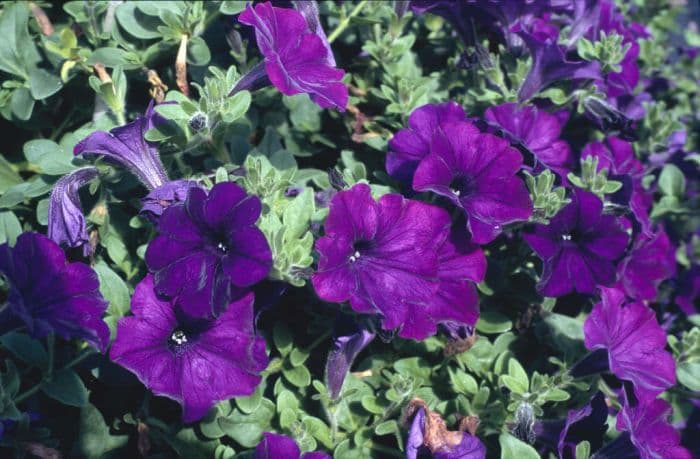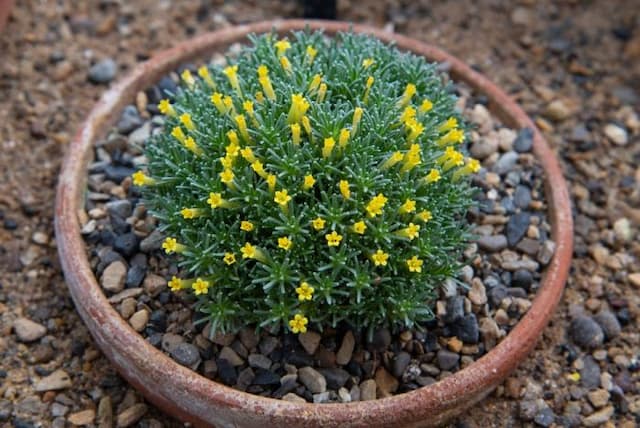Petunia Petunia 'Charlie's Angels Charlie' (Charlie's Angels Series)

ABOUT
The Petunia 'Charlie's Angels Charlie' is recognized for its striking, vibrant flowers and lush foliage. Each flower showcases a rich blend of color, usually with gradients or bold patterns that can include hues from deep purples and pinks to bright whites and reds. The petals are soft and velvety to the touch, having rounded shapes with slightly ruffled edges that contribute to their ornate appearance. As a characteristic trait of petunias, the 'Charlie's Angels Charlie' variety blooms profusely, providing a robust display of color. The leaves are equally lush, presenting a bright green color and a somewhat sticky texture. They are usually oval or heart-shaped and can grow quite dense, forming a backdrop that further accentuates the floral display. The plant overall possesses a mounding or trailing habit, which makes it attractive for hanging baskets, garden beds, or as a border plant. It can spread its branches out, with the flowers dotting along the stems to create a cascading effect that is particularly charming. This petunia variety is not only prized for its beauty but also for its ability to bloom throughout the growing season, offering a long-lasting display that gardeners and flower enthusiasts admire.
About this plant
 Names
NamesFamily
Solanaceae
Synonyms
Charlie's Petunia, Charlie's Angels Petunia
Common names
Petunia 'Charlie's Angels Charlie'
 Toxicity
ToxicityTo humans
Petunias are not considered toxic to humans. There is no well-documented case or significant evidence suggesting that Petunias, including the ‘Charlie’s Angels Charlie’ cultivar, pose a risk if ingested. However, it's generally advisable not to consume ornamental plants due to the possible presence of pesticides or other chemicals used during cultivation. If a person were to ingest parts of a Petunia plant, it is unlikely to result in poisoning.
To pets
Petunias are generally considered non-toxic to pets, including dogs and cats. As such, the Petunia 'Charlie's Angels Charlie' variety does not pose a significant risk of toxicity if pets happen to ingest it. While consumption of non-food plants can sometimes cause mild gastrointestinal upset in pets, such as vomiting or diarrhea, petunias are not known to cause serious harm or toxic reactions. Owners should still monitor their pets and discourage them from eating ornamental plants, largely due to the potential presence of pesticides or other non-plant elements in the environment that could be harmful.
 Characteristics
CharacteristicsLife cycle
Annuals
Foliage type
Deciduous
Color of leaves
Green
Flower color
Mixed
Height
1 foot (30 centimeters)
Spread
1 foot (30 centimeters)
Plant type
Herb
Hardiness zones
9
Native area
South America
Benefits
 General Benefits
General Benefits- Enhances Garden Aesthetics: Adds vibrant color and visual interest to garden beds, borders, and containers.
- Easy to Grow: Requires minimal care, making it suitable for gardeners of all skill levels.
- Attracts Pollinators: Draws bees, butterflies, and other beneficial insects, supporting local ecosystems.
- Versatile: Can be used in a variety of garden designs, from hanging baskets to ground cover.
- Continuous Blooming: Offers extended flowering period from spring to frost for long-lasting beauty.
- Drought Tolerance: Once established, it can withstand periods of low water, reducing the need for frequent irrigation.
- Low Maintenance: Generally resistant to pests and diseases, reducing the need for chemical treatments.
 Medical Properties
Medical PropertiesThis plant is not used for medical purposes.
 Air-purifying Qualities
Air-purifying QualitiesThis plant is not specifically known for air purifying qualities.
 Other Uses
Other Uses- Petunias can be used in art projects such as pressing the flowers for decorative bookmarks or adding them to clear resin to make unique jewelry pieces.
- The vibrant colors of petunias can be used as a natural dye for fabrics or paper, creating subtle hues for craft enthusiasts.
- Petunia petals can be used in potpourri mixes for a pop of color and a mild, pleasant fragrance in your home.
- They can be planted in vegetable gardens as companion plants to certain vegetables like tomatoes and peppers, possibly helping to deter pests with their scent.
- Petunias can serve as a learning tool in schools for children to understand plant growth, pollination, and life cycles through hands-on gardening experience.
- The flowers can be used to create a colorful, edible garnish for salads and desserts, provided they have not been treated with pesticides or other chemicals.
- Used in sensory gardens, petunias can provide a tactile experience due to their soft petals, and their scent adds an olfactory element to the garden.
- They can be part of a natural insect-repelling garden setup by possibly deterring aphids and other pests with their scent.
- Petunias can be used to create temporary natural art installations in public spaces, promoting community engagement and environmental awareness.
- Photographers can use petunias as a subject or backdrop for photoshoots due to their vibrant colors and versatile appearance in landscapes or macro photography.
Interesting Facts
 Feng Shui
Feng ShuiThe petunia is not used in Feng Shui practice.
 Zodiac Sign Compitability
Zodiac Sign CompitabilityThe petunia is not used in astrology practice.
 Plant Symbolism
Plant Symbolism- Anger or Resentment - Petunias can symbolize a feeling of anger or resentment, possibly due to their bold colors and the way they can take over a space if left unchecked.
- Desire - The vibrant colors and voluptuous shape of the flower can embody a strong desire or passion.
- Comfort - As a popular garden plant, petunias can represent a sense of comfort and familiarity, bringing a cozy feel to any environment.
- Friendship - Giving petunias can indicate a friendship that is pleasing and amiable.
 Water
WaterPetunias, including the 'Charlie's Angels Charlie' variety, should be watered thoroughly whenever the top inch of soil feels dry to the touch. Typically, this means watering once a week, but in hot or windy weather, they may require more frequent watering, such as every few days. When watering, use enough water to moisten the soil to a depth of about 6 inches. It's important to avoid overwatering, which can lead to root rot. For container-grown petunias, ensure that the pot has adequate drainage and water until it begins to run out of the bottom of the container.
 Light
LightPetunias, including the 'Charlie's Angels Charlie' type, thrive in full sunlight, which means they need at least six to eight hours of direct sunlight each day. The best spot for these plants is a location where they can receive morning sunlight, which is less intense than the afternoon sun. However, they are versatile enough to withstand some light afternoon shade, especially in hotter climates.
 Temperature
TemperaturePetunias prefer warmer temperatures and will perform best when daytime temperatures are between 60 and 75 degrees Fahrenheit, although they can tolerate higher temperatures as long as they are adequately watered. The Charlie's Angels Charlie petunias shouldn't be exposed to temperatures below 40 degrees Fahrenheit, as they are sensitive to frost. To ensure optimal growth, keep them in an environment that avoids extreme temperature fluctuations.
 Pruning
PruningRegular pruning of petunias, including 'Charlie's Angels Charlie', is essential to encourage bushier growth and more blooms. Deadheading, or removing faded flowers, should be done regularly to prevent the plant from putting energy into seed production. Additionally, light pruning or pinching back the stems can help to stimulate new growth and should be done every few weeks or when the plant appears leggy. The best time to prune is in the early morning or late afternoon when the plant is not in full sun.
 Cleaning
CleaningAs needed
 Soil
SoilPetunias thrive in light, fertile, well-draining soil with a pH between 5.5 and 6.5. A mixture of peat moss, compost, and perlite or vermiculite can provide the necessary drainage and nutrients.
 Repotting
RepottingPetunias, like the 'Charlie's Angels Charlie', are annuals and do not typically require repotting as they will only last for one growing season.
 Humidity & Misting
Humidity & MistingPetunias prefer moderate humidity levels but are quite adaptable and do not require specific humidity adjustments.
 Suitable locations
Suitable locationsIndoor
Place in bright light; keep soil moist, not wet.
Outdoor
Full sun, well-drained soil, regular watering, deadhead spent flowers.
Hardiness zone
9-11 USDA
 Life cycle
Life cycleThe life of a petunia, including the 'Charlie's Angels Charlie' variety, begins with seed germination, where the seed absorbs water, swells, and the embryonic plant starts to grow. After sprouting, the seedling stage follows, characterized by the emergence of the first true leaves, which facilitate photosynthesis. As the petunia transitions into vegetative growth, the plant develops a stronger stem, more leaves, and begins to establish a robust root system. It then enters the flowering stage, during which the petunia produces vibrant flowers that attract pollinators and can be enjoyed by gardeners; this stage can last several months with proper care. Following pollination, the plant sets seeds, completing the reproductive cycle and ensuring the continuation of the species. In temperate climates, petunias, often grown as annuals, will die back with the first frost, although in their native or suitable warm climates, they may survive as perennials, continuing their lifecycle over multiple years.
 Propogation
PropogationPropogation time
Spring-Summer
Petunia 'Charlie's Angels Charlie', commonly known simply as Petunia, is most frequently propagated through seed. The ideal time to sow Petunia seeds is in late winter to early spring, to allow the plants to reach a suitable size for transplanting after the last frost. To propagate Petunias by seed, you should start by scattering the tiny seeds onto the surface of a well-draining seed starting mix and gently press them into the soil, as they need light to germinate. Covering the seed container with plastic wrap or a plastic dome can help maintain humidity. Place the container in a warm area with a temperature around 70 to 75 degrees Fahrenheit (21 to 24 degrees Celsius) and provide plenty of bright light. Seedlings typically emerge in 7-10 days. Once they have grown large enough to handle and there's no more risk of frost, the young plants can be transplanted outdoors.



![Petchoa [Beautiful Cinnamon]](/_next/image?url=https%3A%2F%2Fplants-admin.emdemapps.com%2Fimages%2Fplants%2F%2Fimages%2F604b56f650ada.png&w=640&q=75)



![Calibrachoa [Cabaret Sky Blue]](/_next/image?url=https%3A%2F%2Fplants-admin.emdemapps.com%2Fimages%2Fplants%2F%2Fimages%2F604b5fcd96809.png&w=640&q=75)
![Calibrachoa [Caloha Double Peach]](/_next/image?url=https%3A%2F%2Fplants-admin.emdemapps.com%2Fimages%2Fplants%2F%2Fimages%2F604b63d40ceae.png&w=640&q=75)
![Calibrachoa [Colibri Orange]](/_next/image?url=https%3A%2F%2Fplants-admin.emdemapps.com%2Fimages%2Fplants%2F%2Fimages%2F604b5d750c055.png&w=640&q=75)